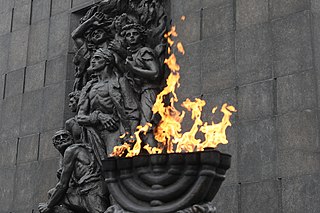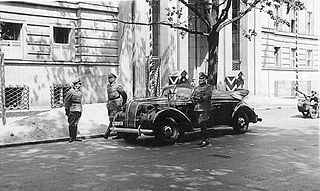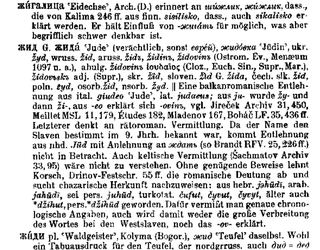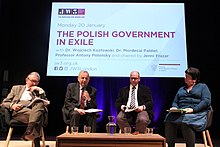
The Second Polish Republic, at the time officially known as the Republic of Poland, was a country in Central Europe that existed between 7 October 1918 and 6 October 1939/1944. The state was established in the final stage of World War I. The Second Republic ceased to exist in 1939, after Poland was invaded by Germany, the Soviet Union, and the Slovak Republic, marking the beginning of the European theatre of the Second World War. The Polish government-in-exile was established in Paris to replace the Second Republic in the war.

Józef Klemens Piłsudski was a Polish statesman who served as the Chief of State (1918–1922) and first Marshal of Poland. In the aftermath of World War I, he became an increasingly dominant figure in Polish politics and exerted significant influence on shaping the country's foreign policy. Piłsudski is viewed as a father of the Second Polish Republic, which was re-established in 1918, 123 years after the final partition of Poland in 1795, and was considered de facto leader (1926–1935) of the Second Republic as the Minister of Military Affairs.

The Jedwabne pogrom was a massacre of Polish Jews in the town of Jedwabne, German-occupied Poland, on 10 July 1941, during World War II and the early stages of the Holocaust. Estimates of the number of victims vary from 300 to 1,600, including women, children, and elderly, many of whom were locked in a barn and burned alive.

The history of the Jews in Poland dates back at least 1,000 years. For centuries, Poland was home to the largest and most significant Ashkenazi Jewish community in the world. Poland was a principal center of Jewish culture, because of the long period of statutory religious tolerance and social autonomy which ended after the Partitions of Poland in the 18th century. During World War II there was a nearly complete genocidal destruction of the Polish Jewish community by Nazi Germany and its collaborators of various nationalities, during the German occupation of Poland between 1939 and 1945, called the Holocaust. Since the fall of communism in Poland, there has been a renewed interest in Jewish culture, featuring an annual Jewish Culture Festival, new study programs at Polish secondary schools and universities, and the opening of Warsaw's Museum of the History of Polish Jews.
Marek Jan Chodakiewicz is a Polish-American historian specializing in Central European history of the 19th and 20th centuries. He teaches at the Patrick Henry College and at the Institute of World Politics. He has been described as conservative and nationalistic, and his attitude towards minorities has been widely criticized.
Żydokomuna is an anti-communist and antisemitic canard, or a pejorative stereotype, suggesting that most Jews collaborated with the Soviet Union in importing communism into Poland, or that there was an exclusively Jewish conspiracy to do so. A Polish language term for "Jewish Bolshevism", or more literally "Jewish communism", Żydokomuna is related to the "Jewish world conspiracy" myth.

The Ponary massacre, or the Paneriai massacre, was the mass murder of up to 100,000 people, mostly Jews, Poles, and Russians, by German SD and SS and their Lithuanian collaborators, including Ypatingasis būrys killing squads, during World War II and the Holocaust in the Generalbezirk Litauen of Reichskommissariat Ostland. The murders took place between July 1941 and August 1944 near the railway station at Ponary, a suburb of today's Vilnius, Lithuania. 70,000 Jews were murdered at Ponary, along with up to 20,000 Poles, and 8,000 Soviet POWs, most of them from nearby Vilna (Vilnius), and its newly formed Vilna Ghetto.

Neighbors: The Destruction of the Jewish Community in Jedwabne, Poland is a book published in 2000 written by Princeton University historian Jan T. Gross exploring the July 1941 Jedwabne massacre committed against Polish Jews by their non-Jewish neighbors in the village of Jedwabne in Nazi-occupied Poland.
Shaul Stampfer is a researcher of East European Jewry specializing in Lithuanian yeshivas, Jewish demography, migration and education.

Yohanan Petrovsky-Shtern is an American historian, philologist and essayist, noted in particular for his studies of the institution of Cantonism, his critique of Aleksandr Solzhenitsyn's controversial two volume-work about Jews in Russia, Two Hundred Years Together, as well as translations of Jorge Luis Borges' works into Russian. He is the Crown Family Professor of Jewish Studies and a Professor of Jewish History in History Department at Northwestern University where he teaches Early Modern, Modern and East European Jewish history.
Joanna Beata Michlic is a Polish social and cultural historian specializing in Polish-Jewish history and the Holocaust in Poland. An honorary senior research associate at the Centre for Collective Violence, Holocaust and Genocide Studies at University College London (UCL), she focuses in particular on the collective memory of traumatic events, particularly as it relates to gender and childhood.
The Koniuchy massacre or the Kaniūkai massacre was a World War II massacre of civilians, mostly women and children, carried out in the village of Koniuchy on 29 January 1944 by a Soviet partisan unit together with a contingent of Jewish partisans under Soviet command. At least 38 civilians who have been identified by name were killed, and more than a dozen were injured. In addition, houses were burned and livestock was slaughtered. It was the largest atrocity committed by the Soviet partisans in present-day Lithuania.

Wolfgang Birkner was a German SS functionary and a Holocaust perpetrator in World War II. Birkner served as the KdS Warschau in Warsaw following the German invasion of Poland in 1939.

Zhyd and Zhydovka are terms for Jewish man and Jewish woman, respectively, in several Slavic languages. In some of those languages, they are considered pejorative.

Monsignor Waldemar Chrostowski is a Polish Catholic priest, Bible scholar, and theologian. He is a professor of theology at the Cardinal Stefan Wyszynski University in Warsaw. Chrostowski has attracted attention for propagating antisemitic and homophobic views.
Joshua D. Zimmerman holds the Eli and Diana Zborowski Professorial Chair in Holocaust Studies and East European Jewish History at Yeshiva University. He is the author or editor of several works about the Holocaust, including Contested Memories. Poles and Jews during the Holocaust and Its Aftermath (2003) and The Polish Underground and the Jews, 1939–1945 (2015).
Gershon David Hundert was a Canadian historian of Early Modern Polish Jewry and Leanor Segal Professor at McGill University.
Glenn Davis Dynner is an American author and historian specializing in religion and history of East European Jewry. He is the Co-Editor-in-Chief of Shofar: An Interdisciplinary Journal of Jewish Studies and a Professor and Chair of Religion at Sarah Lawrence College.
The Alfonse pogrom was a three-day riot in Warsaw, Poland. The violence led to the destruction of several dozen brothels, and to as many as 15 deaths. Accounts and analyses of the event differ with regard to its goals and participants.
Undzer shtime was a Yiddish language newspaper published in Vilna in 1918–1920. It was published monthly from August to November of 1918, but became a daily on December 6, 1918, as the German army was retreating out of the city. The newspaper was the organ of the Lithuania Regional Committee of the General Jewish Labour Bund in Lithuania, Poland and Russia. Max Weinreich was the editor of Undzer shtime from December 1918 until mid-May 1919. He was succeeded by Paul Novick.










